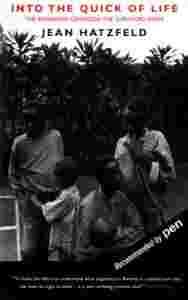|
==
==
RWANDA / RUANDA / AFRYKA / AFRICA / BURUNDI / KONGO / UGANDA / LUDOBÓJSTWO / WOJNA / FRANCJA / KOLONIALIZM / COLONIALISM
Nagość życia. Opowieści z bagien Rwandy
==
Translated from the French by Gerry Feehily
Dans le nu de la vie. Récits des marais rwandais
Photographs by Raymond Depardon
==
Wyd. Serpent's Tail. London 2005.
Stron 177
|
ZOBACZ POZOSTAŁE AUKCJE !!!
ZAKUP NA KILKU AUKCJACH - JEDEN KOSZT WYSYŁKI (jak przy aukcji, na której jest on najwyższy). Żadnych dodatkowych dopłat.
OPCJE WPŁATY:
1) PayU - najsprawniej i najbezpieczniej (kartą Visa, Master Card lub e-przelewem),
2) Na konto bankowe
International customers
SHIPPING WORLDWIDE
Przy zakupie na kilku aukcjach i wysyłce międzynarodowej patrz stronę "O mnie"
|
|
Five out of six Tutsis were hacked to death with machetes and spears by their Hutu neighbours. In the villages of Nyamata and N’tarama, where, in the first two days of the genocide, over 10,000 Tutsis were massacred in the churches where they sought refuge, Jean Hatzfeld interviewed some of the survivors.
Of all ages, from different walks of life, from orphan teenage farmers to the local social worker, fourteen survivors talk of the genocide, the death of family and friends in the church and in the marshes of Bugesera to which they fled. They also talk of their present life and try to explain and understand the reasons behind the extermination. These horrific accounts of life at the very edge contrast with Hatzfeld’s own sensitive and vivid descriptions of Rwanda’s villages and countryside in peacetime. Into the Quick of Life brings us, in the author’s own words, ‘as close to [the event] as we can ever get’.
Jean Hatzfeld was born in Madagascar in 1949, where his father was a teacher. His Jewish parents had moved there seven years earlier, fleeing from the Nazis, but he and his family eventually returned to the Auvergne region.
After having various jobs, Jean Hatzfeld started to work as journalist for the French daily Libération in 1977. He also contributed to other newspapers and magazines, such as L’Autre Journal, Géo, Actuel, Rolling Stones, Autrement; and he has directed four TV documentaries.
As a special correspondent and war reporter, Hatzfeld travelled extensively throughout Eastern European countries, from the advent of Solidarnosc in Poland until the fall of Berlin’s Wall. He covered the ‘Velvet Revolution’ in former Czechoslovakia and the fall of the Ceausescu regime in Romania.
For 25 years, since the end of 1970s, he mainly worked in the war-affected countries of the Middle East, in Lebanon, Israel and recently in Iraq. He spent three years in countries of Former Yugoslavia, between Vukovar and Sarajevo. In Sarajevo he was seriously injured through a Kalashnikov salvo. Hatzfeld published two books set against this background: L’Air de la guerre (1994), evoking his experiences in the former Yugoslavia; and La guerre au bord du fleuve (1999), a novel inspired by the war. He also worked in Haiti, Congo, Algeria, Burundi and Iran.
In 1994, Jean Hatzfeld travelled to Rwanda to report about the massacre there, and its aftermath, for Libération. He later decided to leave daily journalism in order to focus solely on research into the genocide. He published Dans le nu de la vie in 2000, in which he reports the stories of Tutsi survivors. The volume was awarded the Prix Culture 2000, the Prix Pierre Mille and the Prix France Culture. Hatzfeld said that after the publication of his first volume, readers expressed interest in hearing the voices of the Hutu perpetrators. Two years later, his conversations with condemned Hutus culminated in Une Saison de machettes, for which he won the essay category of the Prix Femina in 2003 and the Prix Jossef Kessel in 2004.
Jean Hatzfeld divides his time between Rwanda and Paris.
|
Jean Hatzfeld (ur. w 1949 roku) - reporter, korespondent wojenny, pisarz. Opisywał upadek komunizmu w Europie Środkowej, pracował jako korespondent wojenny z objętych kryzysem zbrojnym krajach Bliskiego Wschodu, na Haiti, w Kongu, Algierii i Burundi, trzy lata spędził w byłej Jugosławii, gdzie został ranny podczas ostrzału Sarajewa. Doświadczenia te zaowocowały dwiema książkami: L'Air de la guerre (1994) oraz La guerre au bord du fleuve (1999).
W 1994 roku wyruszył do Rwandy. Opublikował trzy książki poświęcone rwandyjskiej wojnie domowej: w 2000 roku Nagość życia. Opowieść z bagien Rwandy (nagrodzoną m.in. Prix Pierre Mille i Prix France Culture), w 2003 roku Sezon maczet, za którą otrzymał Prix Joseph Kessel i Prix Femina Essai, oraz Strategię antylop, nagrodzoną w 2007 roku Prix Médicis, jedną z najbardziej prestiżowych francuskich nagród literackich. Za opublikowaną w 2009 roku w Polsce Strategię antylop otrzymał Nagrodę im. Ryszarda Kapuścińskiego 2010.
== Strategia antylop |
| ==
Wiosną 1994 roku, kiedy w Rwandzie Hutu zaczynają mordować Tutsi, Jean Hatzfeld jest w Sarajewie. Pierwsze obrazy ludobójstwa ogląda w telewizji w hotelowym pokoju w San Francisco, gdzie dla dziennika "Libération" relacjonuje mistrzostwa świata w piłce nożnej. Jakiś czas później wyjeżdża do Rwandy, by pisać o ucieczce setek tysięcy Hutu do sąsiednich krajów. Po powrocie do Paryża zastanawia się, dlaczego media tak mało interesują się tymi, którzy przeżyli. W 1997 roku ponownie jedzie do Rwandy, by wysłuchać opowieści ocalonych. Świadectwa trzynaściorga z nich, pierwszych, którzy zdecydowali się mówić, składają się na książkę Nagość życia. Opowieści z bagien Rwandy. |

